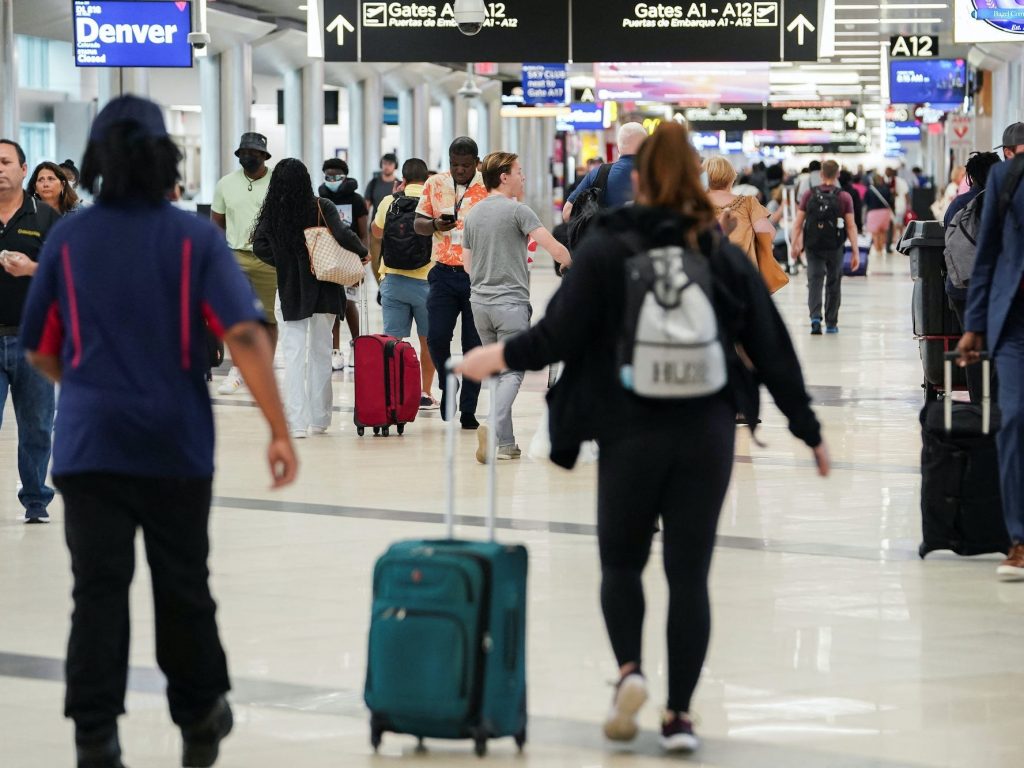- Some Americans are splurging on movies, flights, and sports, but many remain on the sidelines.
- Nearly half of Americans remain uncomfortable flying or attending a sporting event.
- If these concerns subside, there could be a new source of demand in an already heated economy.
Movies are breaking box-office records, air travel is topping pre-pandemic levels, and fans are flocking to sports stadiums — but COVID fears are still keeping millions of Americans on the sidelines.
That's according to Morning Consult's weekly "Return to Normal" polling, which asks roughly 2,200 US adults about their comfort level engaging in various activities — with a margin of error of +/- 2%.
As of June 20, 63% of Americans said they felt "comfortable" attending a movie, compared to 56% and 53% that said they were comfortable flying domestically and attending a sporting event. Those surveyed reported being more comfortable dining at an indoor restaurant — 75% — and going to a shopping mall — 73%.
While many Americans remain hesitant to engage in entertainment and leisure activities, demand — and consequently prices — remain elevated. If fears of the pandemic begin to ease, however, this could release more demand into an economy already experiencing historically high inflation — creating an additional headwind for the Federal Reserve as it looks to slow price growth.
Despite the fact inflation is eating away at earnings and savings, consumer health remains strong. In March, JPMorgan's lowest-income customers averaged roughly $1,400 in checking-account balances, up from $900 before the pandemic, compared to $7,000 for its highest-income customers — up from $5,500. Last Thursday, JPMorgan CEO Jamie Dimon reaffirmed this strength by saying that consumers are in "great shape," suggesting many of those currently fearful of COVID have money to spend if their concerns ever subside.
Strong demand for movies, flights, and sporting events
Since 1960, the cost for a family of four to see a movie — including tickets, popcorn, and drinks — has more than doubled on an inflation-adjusted basis from $34.15 to $68.73, per an analysis by The Hustle. In March, AMC announced it would begin charging a "premium" price for 'The Batman' film.
Over the past year, theaters haven't been immune to inflationary pressures from wages, maintenance and utilities. The price of corn hit a 9-year high in April — driven by impacts to crops during the war in Ukraine — presumably making it a bit more expensive for theaters to provide that large bucket of popcorn. Combine this with strong demand, including 'Top Gun: Maverick' and 'Minions: The Rise of Gru' setting records over their respective holiday weekend releases, and there are a myriad of factors nudging prices higher.
There's a similar story in the airline industry. In June, the Bureau of Labor Statistics reported that airfares had risen 25% over the last 12 months, the largest jump since at least 1989. As of July 14, US roundtrip flights averaged $375, up 13% from 2019.
As pandemic restrictions have eased, Americans have been eager to take advantage of the summer travel season. The TSA screened nearly 2.5 million people on July 1st, up 14% over the same day in 2019. Along with enhanced demand, the cost of jet fuel has risen alongside oil prices, and widespread worker shortages at airlines have created wage pressures. All of these factors have contributed to rising airfares.
In the sports world, there's been strong demand from fans that were forced to watch their favorite teams from home during the pandemic. When NFL ticket prices for this upcoming season were released in May, the average ticket price was $307, up from $258 in 2019. In April, 1st round NBA playoff tickets to watch the Golden State Warriors and Phoenix Suns cost an average of $956 and $676 respectively on the secondary market — the highest prices ever in a season with full seating capacity, per SLAM. The sports marketing firm Team Marketing Report found that the average cost for a family of four to attend a game had risen for each of the four major US sports over the past year.
With COVID cases on the rise in recent months, Americans that are uncomfortable engaging in these activities now may be reluctant to do so anytime soon. But if cases begin to fall, or if Americans begin to accept that the coronavirus simply isn't going away, perhaps this will eventually lead some to fully resume their pre-pandemic lives. In a recent Ipsos poll of over 1,000 Americans, 78% said they "strongly" or "somewhat" agreed with the statement that "We will never fully be rid of the coronavirus in my lifetime."
If Americans previously held back by COVID concerns do begin to flock to the likes of movies, airports, and sporting events, this could work against efforts to combat inflation. That said, as consumers burn through their savings and continue to face high prices, it's possible more Americans will soon join the COVID-wary on the sidelines.
